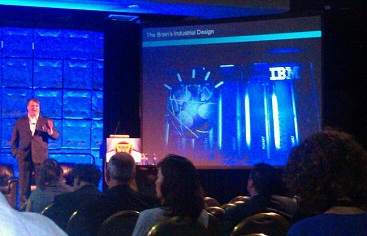IBM held a special keynote event in New York today where it, among other things, discussed the future of Watson.
Watson is the name bestowed to IBM’s artificial intelligence technology that managed to vanquish the two greatest Jeopardy players of all time, including the man who had never lost a Jeopardy tournament, Brad Rutter.

Even though the keynote details listed “Watson” as a speaker, the little guy was not present, not even his avatar likeness. Nevertheless, people who were instrumental in turning a piece of high-concept tech into a viral marketing phenomenon were there to talk about Watson’s place in society and where he’ll go from here.
The special episodes of America’s favorite quiz show easily grabbed the most viewers during their respective time slots around the country, and were the most watched Jeopardy episodes since the seemingly never-ending run of super champ Ken Jennings.
But beyond just being a ratings gimmick for a long-running game show, what can Watson do? Even though 70% of Americans were aware of Watson, according to IBM, and he even made a hit on the late night TV circuit, most Americans probably couldn’t tell you what he’s up to these days.
However, he is up to a lot. IBM VP of Demand Programs Jim Gargan said the primary focus right now is the healthcare industry – automating the process of patient diagnosis, not using a simple computer algorithm but rather thousands of algorithms based on human thought.
“If you think of a Jeopardy board, you know how there are the different columns of questions?” Gargan analogized, computing a medical diagnosis “would be like having 50,000 columns.”
As for how the progress in this field is going, Gargan said he expects real-life implementation of it “soon.”
Watson’s also working on financial market analysis, a concept that was brought to IBM’s attention in light of the 2010 “flash crash” that occurred when automated computer trading systems made massive trading decisions in error. Watson is incorporating real human data to create a system that prevents that from happening again.
And finally, the other big project is in automated phone customer service. IBM wants Watson to replace the chronically unhelpful automated customer service technology currently plaguing the country.
So it’s not that Watson isn’t doing anything, but rather that it’s not well known among the general public. Is that a problem for IBM? Gargan said if he could change one thing about the Watson story to date, it would be this issue. Gargan pointed out that the message about Watson’s potential future came out late in the months-long Watson story and was kind of swept under the rug. “If we had gotten that out sooner, I think we would have had a better response,” he admitted.






